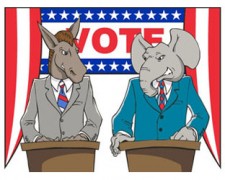 In ex parte meetings with FCC officials, representatives of a number of television group owners have been trying to forge a compromise on posting political advertising information online that would be a win-win for all parties.
In ex parte meetings with FCC officials, representatives of a number of television group owners have been trying to forge a compromise on posting political advertising information online that would be a win-win for all parties.
The key broadcast proposal is to aggregate political spending information for posting in online political files – listing each candidate and non-candidate political advertising and their total spent, submitted on a weekly basis.
Communications law attorney Jonathan D. Blake of Covington & Burling joined Belo Corporation President/CEO Dunia Shive in meeting with FCC Chairman Julius Genachowski and his Legal Advisor, Sherrese Smith, and then Blake met with the FCC Media Bureau’s Holly Sauer, at Media Bureau Chief Bill Lake’s request. Blake was representing Barrington Broadcasting Co., Belo Corp, Cox Media Group, Dispatch Broadcast Group, The E.W. Scripps Company, Gannett Broadcasting, Hearst Television, Meredith Broadcasting Group, Post-Newsweek Stations, Raycom Media, and Schurz Communications.
In his summary of the meeting with Sauer, Blake explained that broadcasters believe submitting the information in this manner would ultimately make it far more useful to journalists, academics and others with an interest in the issue than would a massive pile of spot-by-spot postings.
Concerns that candidates would suddenly lack the ability to assure they are getting their ads at lowest-unit-rate are unfounded, explained Blake, since there would be no change whatsoever to the existing paper file requirements. Politicians would have every bit as much ability to monitor this information as they do at present.
Finally, presenting the information this way would protect television broadcasters from unfair access by their competitors to sensitive pricing information. Blake noted that the knowledge that sensitive information would become instantly available to anybody in the world with internet access could actually motivate some advertisers to shift their budgets to cable, satellite, newspaper or other media to the detriment of broadcasters who alone face this reporting requirement.
Describing one of the hitches in the talks, Blake noted concerns expressed by FCC staff that they cannot discriminate between which pieces of political data from public files go online and which not. Blake argued that there is no requirement that any information be posted online, and that it was perfectly reasonable for the FCC to make such a determination. In fact, the FCC has already made such a determination in an unrelated area in its decision to make online postings of correspondence between citizens and stations. Blake said if the FCC can discriminate in that instance, it can discriminate in this instance as well.
Blake said in his opinion that the station groups he was representing were open to further discussions and further compromises in an effort to find a solution that is satisfactory to all parties.
RBR-TVBR observation: As journalists, we believe the broadcast offer to provide aggregate data would be preferable to a massive blizzard of virtual paper. Wouldn’t it be great to call up a station on the FCC-maintained database and see it all right there?
Candidate A: $10,000. Candidate B: $7,500. LeftyPAC: $25,000. RightyPAC: $25,000. DCCC: $7,500. RNCC: $7,500.
It would be relatively easy to compute weekly spending on any market of interest. Submit that data on a spot-by-spot basis, however, and forget it. The drudgery and time-consumption would be expensive and impossible to fit into tight time frames.
The powers that be should actively pursue this excellent broadcast offer, and seek ways to extend it to other competing media and make it truly fair and informative.





